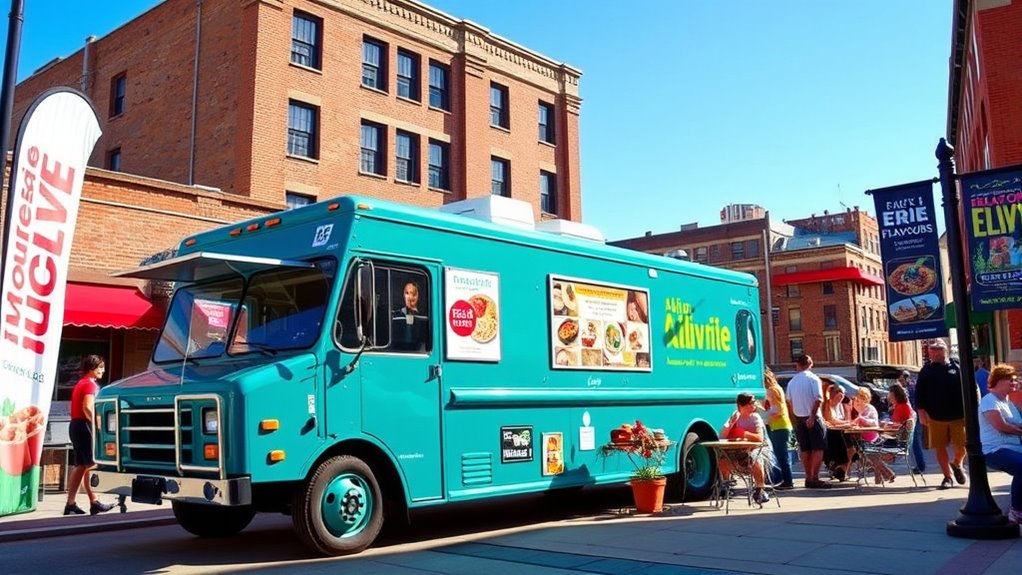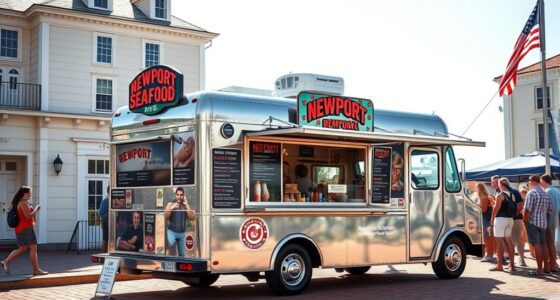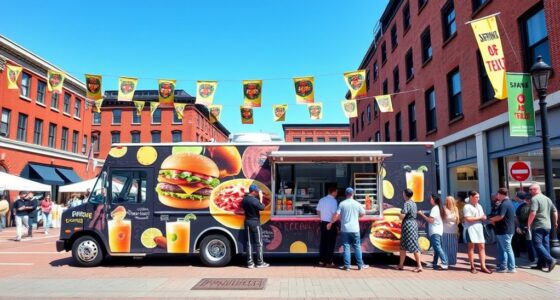To open a food truck in Erie, Pennsylvania, you need to secure permits like the Mobile Food Facility license, budget around $40,000 to $150,000 for your truck and supplies, and find suitable locations with proper zoning approval. You’ll want a menu aligned with local food codes and appealing to Erie’s residents. Effective marketing efforts, including social media and event participation, will help grow your business. Keep exploring these steps to build a successful truck-based venture.
Key Takeaways
- Obtain necessary permits from Pennsylvania and Erie County, including a Mobile Food Facility license, with applications submitted 60 days prior.
- Budget $40,000 to $150,000 for vehicle purchase, outfitting, permits, and initial inventory, plus ongoing operating costs.
- Secure approved locations by consulting Erie zoning regulations, targeting downtown, parks, events, and underserved neighborhoods.
- Develop compliant menus emphasizing food safety, allergen info, and local ingredients, tailored to Erie’s community preferences.
- Promote your food truck via social media, participate in local events, and build community partnerships to grow brand awareness.
Navigating Permit Requirements and Licensing Processes in Erie
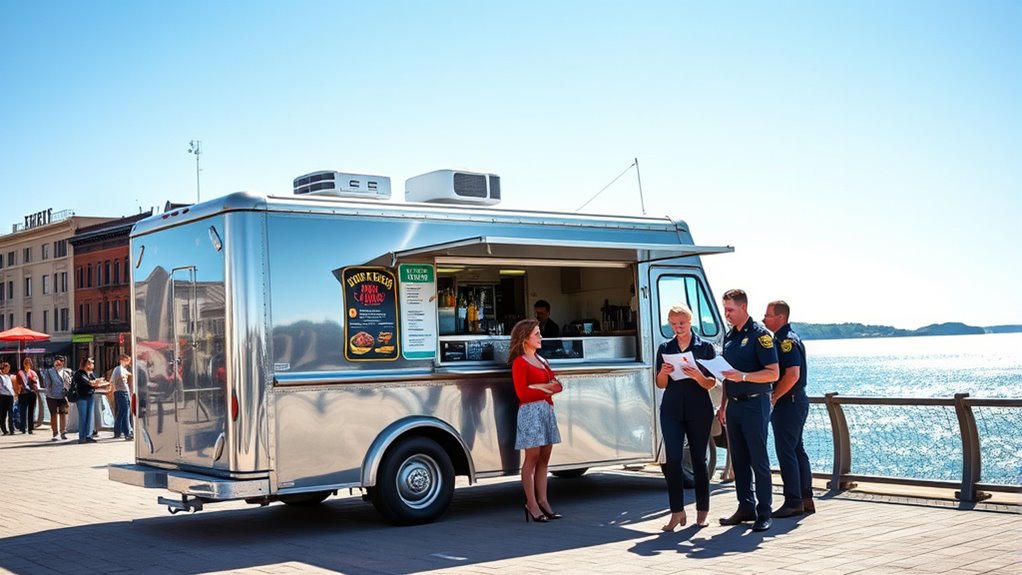
Understanding the permit requirements and licensing processes is essential before starting your food truck business in Erie. You’ll need a Mobile Food Facility (MFF) License from Pennsylvania, which costs around $241 for a new permit. Additionally, you might require a Food Establishment Retail, Non-permanent Location License (~$165) and must handle Business Income and Receipts Tax Returns. Licensing is managed at both the state and county levels, with Erie County’s health department overseeing inspections. You must submit your application at least 60 days before opening, including detailed plans, menus, and floor layouts. The process typically takes 30 to 60 days. Licenses are valid for one year, non-transferable, and must be visibly displayed during operations to avoid revocation. A Food Safety Certificate is also required for employees, which involves completing a 16-hour approved course to ensure food safety standards are maintained during operation. Moreover, understanding regulatory compliance is crucial to avoid potential fines or business interruptions.
Understanding Costs and Budgeting for Your Food Truck Business
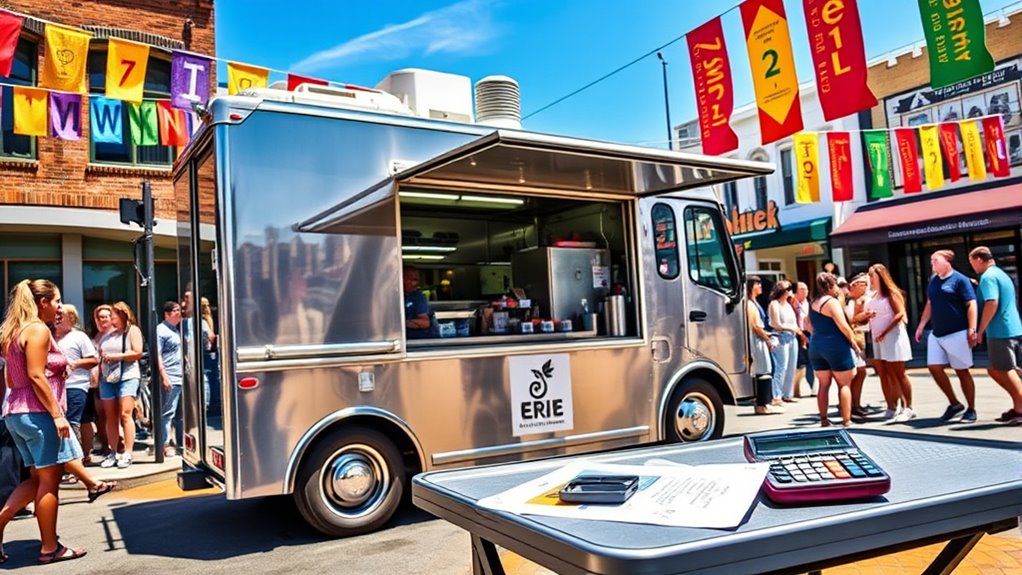
Starting a food truck business in Erie requires careful planning of your finances from the outset. Your initial investment can range from $40,000 to $150,000, depending on whether you buy new or used and how much outfitting your truck needs. Costs include vehicle purchase, kitchen equipment, branding, signage, and permits, which in Pennsylvania typically run $100 to $200 annually. You’ll need about $2,000 to $3,000 for initial inventory and additional funds for marketing efforts like menus and promotional materials. Operating expenses include weekly ingredient costs around $1,000, monthly fuel and maintenance from $500 to $1,000, and ongoing supplies. Don’t forget to budget for licensing renewal fees, insurance, and unexpected repairs to keep your business financially healthy. Monthly expenses can vary depending on your menu offerings and location, so tracking your costs closely can help ensure profitability. Additionally, understanding the costs and budgeting involved can help you plan effectively and avoid surprises.
Finding Prime Locations and Zoning Regulations in Erie
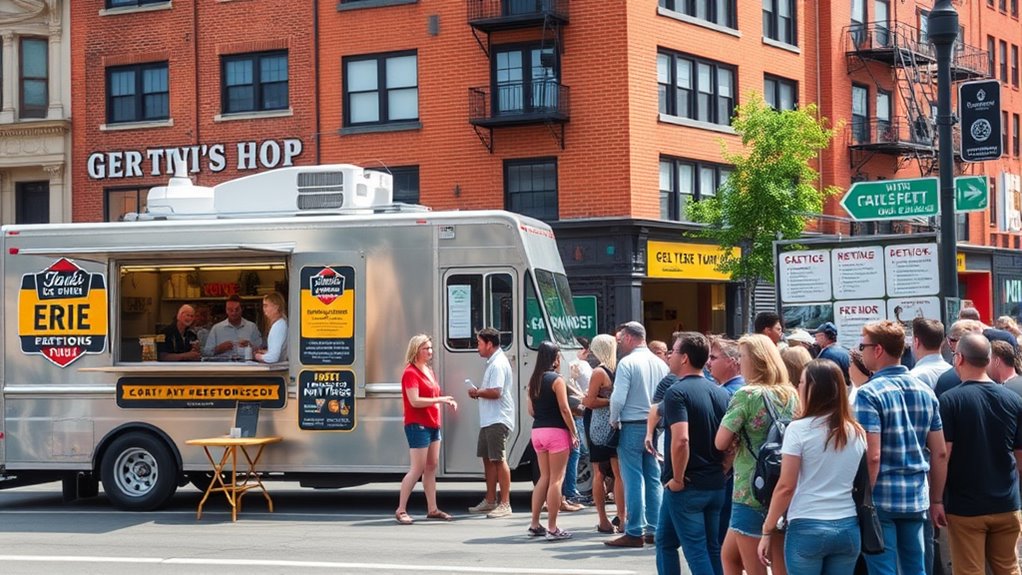
To operate a successful food truck in Erie, you need to navigate local zoning regulations carefully, as approval from city planning authorities is mandatory before you start vending. You must check specific Erie regulations on parking and permitted zones, which vary by land use type such as commercial, industrial, or residential areas. Compliance with Erie County and municipal ordinances related to road use, parking, and signage is essential. Your chosen location should meet requirements for utilities, sanitation standards, and accessibility. Prime spots include high foot-traffic areas like downtown Erie, parks, event venues, and near office complexes. Consider underserved neighborhoods to capture unmet demand. Remember, you’ll need to submit a detailed plan 4-6 weeks in advance for approval, including proposed locations and operational details. Understanding local zoning regulations ensures your food truck remains compliant and operationally successful.
Crafting a Compliant and Appealing Menu for Local Customers
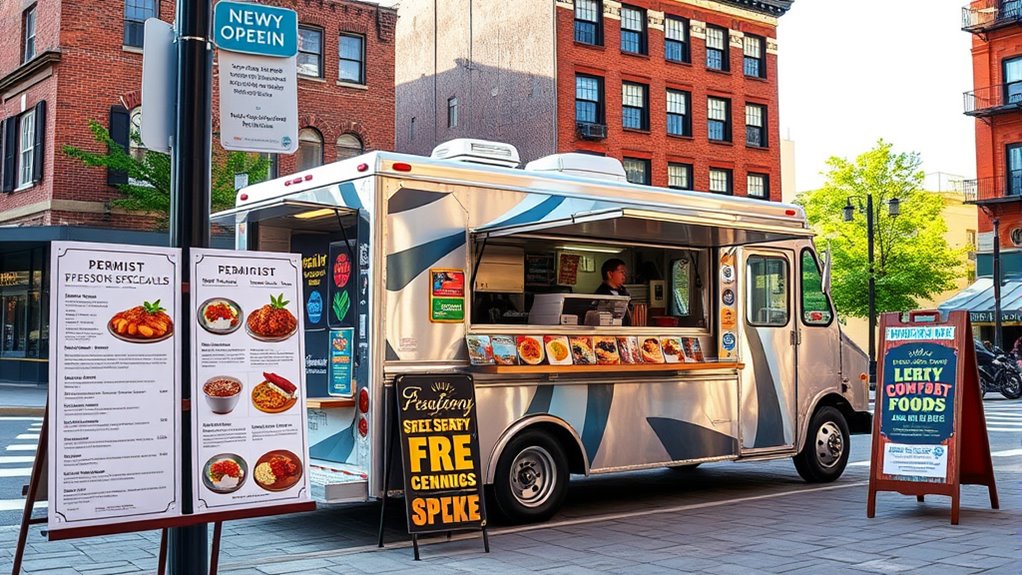
Crafting a menu that’s both compliant with Erie’s food safety regulations and appealing to local customers requires careful planning. You need to guarantee your offerings follow Erie County’s food code and align with your mobile food facility type. Focus on safe handling, allergen labeling, and avoiding cross-contamination. To make your menu enticing, consider local tastes and seasonal ingredients. Keep these key points in mind:
- Include allergen info and transparent preparation methods
- Offer popular or culturally relevant dishes
- Select menu items suitable for your facility’s equipment and storage
- Use prepackaged or minimal-prep foods for temporary or event-based licenses
- Incorporate local customer preferences to better cater to Erie’s community and boost your sales
Balancing compliance with customer preferences ensures your food truck stands out while meeting all safety standards.
Effective Marketing Strategies to Grow Your Food Truck Presence
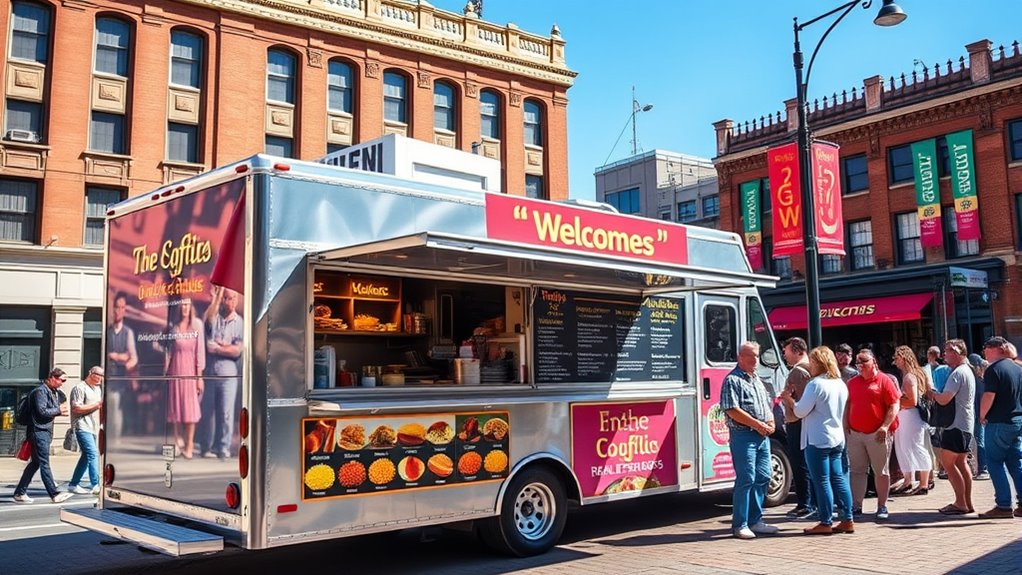
Growing your food truck’s presence requires strategic marketing efforts that capture local attention and build a loyal customer base. Leveraging social media, especially Facebook, is essential—75% of food trucks actively promote there, boosting visibility and increasing customer spending by around 15%. Targeted ads help 40% of customers discover your truck, leading to more foot traffic. Participating in local festivals and events exposes you to large crowds, fostering direct engagement, loyalty, and opportunities to test new menu items. Creating loyalty programs, integrated with mobile apps or social media, encourages repeat visits, increasing revenue and customer retention. Using data analytics and GPS tracking helps tailor marketing efforts, optimize locations, and maximize sales. According to recent studies, digital marketing strategies can increase customer engagement by up to 50%, making them crucial for growth. Additionally, understanding Pimple Patch trends can inspire unique branding or promotional ideas that resonate with health-conscious or skincare-focused consumers. Partnering with local businesses and charities strengthens community ties and enhances your brand’s local presence.
Frequently Asked Questions
What Are the Specific Health Inspection Procedures in Erie for Food Trucks?
You need to prepare for Erie’s health inspection process by ensuring your food truck complies with Pennsylvania Food Code standards. You’ll submit a detailed application, undergo a pre-operational inspection focusing on sanitation, temperature control, and equipment, and have a knowledgeable Person-In-Charge present during all operations. After passing, you’ll get your license, which must be renewed annually. Regular unannounced inspections check your ongoing compliance with food safety practices.
How Do I Find a Licensed Commissary or Commercial Kitchen in Erie?
To find a licensed commissary or commercial kitchen in Erie, start by checking online directories like The Kitchen Door or regional listings such as Penn State Extension’s directory. Contact Erie County’s Environmental Health Division to verify licensing and compliance. Reach out to local food truck communities for recommendations, and consider visiting potential kitchens to make certain they meet your needs. Remember, a licensed commissary is essential for legal and safe food truck operations.
Are There Restrictions on Operating Hours for Food Trucks in Erie?
You might wonder if Erie has specific rules on food truck hours. While there’s no statewide or county limit, local zoning and city ordinances could restrict your operating hours. Check with Erie’s planning or zoning departments to avoid fines or permit issues. Also, event organizers or private venues may set their own hours, so always confirm those beforehand. Operating outside approved times risks license suspension or losing event access.
What Insurance Coverage Is Mandatory for Erie Food Truck Operators?
Did you know that most cities require at least $1 million in general liability insurance? For Erie food truck operators, mandatory coverage includes general liability, commercial auto, and workers’ compensation if you have employees. You’ll also need property damage coverage. These insurances protect you from legal and accident-related costs, and adhering to these requirements guarantees you stay legal and safe while serving your community.
How Can I Stay Updated on Erie’S Changing Food Truck Regulations?
To stay updated on Erie’s changing food truck regulations, you should regularly check the Erie County Department of Health’s website for updates and fee schedules. Sign up for newsletters or alerts from Erie County and Pennsylvania’s Department of Agriculture. Join local industry associations and attend food safety webinars. Use Google Alerts with relevant keywords and follow social media groups for peer insights, ensuring you’re informed about new rules and compliance requirements.
Conclusion
Starting your food truck in Erie can be rewarding if you stay compliant and strategic. For example, a local chef launched her truck near the waterfront, combining a tasty menu with social media marketing to attract crowds. By understanding permits, budgeting wisely, choosing the right location, and crafting a menu that resonates, you’ll set yourself up for success. Focus on building community connections and promoting your brand—your food truck’s success depends on it.
